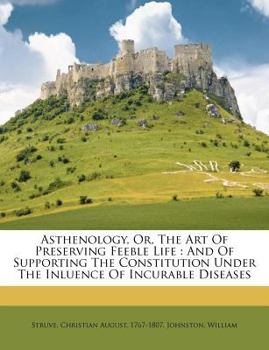Asthenology, Or, the Art of Preserving Feeble Life: And of Supporting the Constitution Under the Inluence of Incurable Diseases
"Asthenology, Or, The Art Of Preserving Feeble Life" by Christian August Struve offers a fascinating glimpse into medical thought and practice at the turn of the 19th century. This historical work, translated and adapted by William Johnston, explores methods for supporting the constitution when faced with incurable diseases and the challenges of aging. Struve's treatise provides insights into the medical understanding of his time, revealing approaches to managing health and prolonging life within the constraints of then-available knowledge.
The book delves into the principles of preserving health and managing illness during an era when medical science was rapidly evolving. It reflects the concerns and priorities of doctors and patients dealing with the limitations of medical intervention, making it a valuable resource for those interested in the history of medicine, geriatrics, and public health. This edition makes Struve's work accessible to modern readers, offering a unique perspective on the art of preserving life in the face of adversity.
This work has been selected by scholars as being culturally important, and is part of the knowledge base of civilization as we know it. This work was reproduced from the original artifact, and remains as true to the original work as possible. Therefore, you will see the original copyright references, library stamps (as most of these works have been housed in our most important libraries around the world), and other notations in the work.
This work is in the public domain in the United States of America, and possibly other nations. Within the United States, you may freely copy and distribute this work, as no entity (individual or corporate) has a copyright on the body of the work.
As a reproduction of a historical artifact, this work may contain missing or blurred pages, poor pictures, errant marks, etc. Scholars believe, and we concur, that this work is important enough to be preserved, reproduced, and made generally available to the public. We appreciate your support of the preservation process, and thank you for being an important part of keeping this knowledge alive and relevant.
Related Subjects
History




